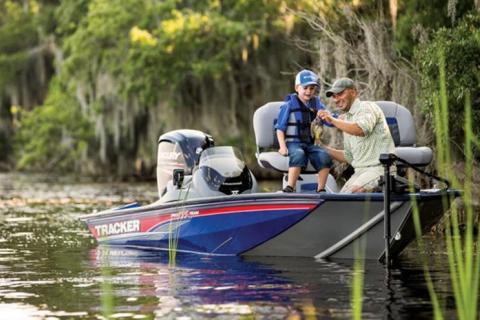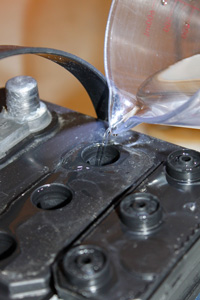
Batteries and boats go hand-in-hand, whether you rely on the cranking power needed to start your engine or a constant current from a deep-cycle to run your electronics. Proper boat battery maintenance can ensure a long life and hassle-free partnering, but most of all, keep you from sitting on the dock when everyone else is wetting a line.
Check Your Levels
 |
| Having an adequate electrolyte level is one of the most important steps in battery maintenance. |
Having an adequate electrolyte level is one of the most important steps in battery maintenance, more so during periods of heavy use or in hot weather conditions. For most boat batteries, remove cell caps and visually inspect levels. Add distilled water when electrolyte is low. Careful not to overfill. This will cause a loss of electrolyte, leading to performance issues and a decrease in battery life.
![]() Extra Tip: Safety goggles should be worn at all times when checking and/or filling levels.
Extra Tip: Safety goggles should be worn at all times when checking and/or filling levels.
Clean Battery Clamps & Posts
Oxidization on clamps or terminal posts will provide a less than adequate electrical connection, often resulting in problems with engine starts or battery charging. As part of your maintenance program, regularly ensure all cable clamps (including the inside) and posts are clean. This is best accomplished with a wire brush. Once metal is shiny, apply a light film of dielectric grease to prevent future oxidization from occurring.
Keep Boat Batteries Charged
Recharge your deep-cycle batteries fully immediately after a day of fishing. Adhering to this will alleviate sulphation — when sulphur molecules coat the lead plates within the cells — and prolong the life of your battery. Part charges will hasten this process.
![]() Extra Tip: Batteries should be charged slowly, with a 10- to 20-amp charger the most recommended.
Extra Tip: Batteries should be charged slowly, with a 10- to 20-amp charger the most recommended.
![]() Extra Tip: Overcharging can be just as costly to the life of a battery by boiling away the electrolyte. Keep a watchful eye on lights or needles, and shut off when fully charged. Better still, utilize a charger with an automatic shut off for worry-free maintenance.
Extra Tip: Overcharging can be just as costly to the life of a battery by boiling away the electrolyte. Keep a watchful eye on lights or needles, and shut off when fully charged. Better still, utilize a charger with an automatic shut off for worry-free maintenance.
Heed The Battery Thermometer
Cold and heat can both play havoc with the staying power of your battery. When storing them for the winter, ensure batteries are fully charged, and periodically charge them throughout the cold months. Summer heat can also quickly weaken a battery, so pay careful attention to where you store your boat or batteries. A cool climate is your best bet.
![]() Extra Tip: Fully charged and maintained batteries will still discharge naturally, with the rate being faster in warm temperatures as opposed to cold.
Extra Tip: Fully charged and maintained batteries will still discharge naturally, with the rate being faster in warm temperatures as opposed to cold.
Marine batteries can be an expensive investment. Ensure proper maintenance and care, and the pay off will be years of worry free fishing — and more money in your pocket.
- 8666 views

